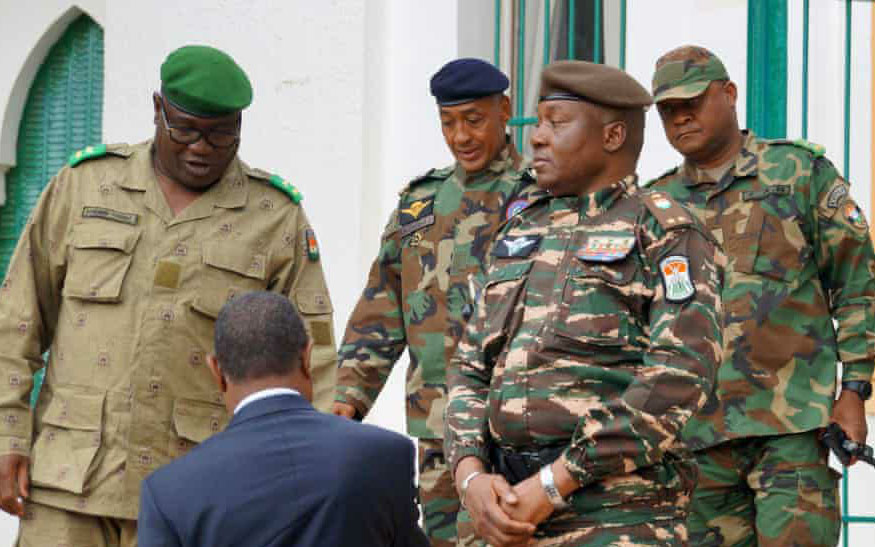
The recent coup in Niger Republic and the attendant diplomatic impasse foretells grave consequences of continued military incursion into the political arena in the West African sub-region. The unfolding scenario in Niger Republic clearly demonstrates that ECOWAS faces daunting challenges ahead considering the complexities of military coups which are better prevented through commitment to the deepening of democracies within the sub-region.
The successful coup d’états in Guinea, Mali, Burkina Faso, and recently in Niger Republic, not only undermine efforts at deepening democracy and exposes ECOWAS member countries to unending political crisis, they also aggravate the risk of protracted destabilisation in the sub-region. More disturbing is that the conundrum of recent military takeover is coming across as a grim reality of the failure of political actors within ECOWAS leadership to act within the ambit of democratic norm. It is regrettable that the recent happenings are antithetical to the wind of pro-democracy agitations that swept across the sub-region in the last decade of the 20th Century; birthing civil rule in countries hitherto bogged down by long years of military dictatorship and sit-tight syndrome.
While resurgence of military incursion could be readily attributed to the failure of leadership which stems from entrenched divisive politics and subversion of State institutions as well as democratic processes, the fact, however, remains that the latest intrusions from the barracks are largely driven by opportunism much more than the failings of elected leaders. Regardless of the shortcomings of duly constituted civil authorities, the military as an institution with clearly defined responsibilities should keep within the limits of its constitutional mandate in affirmation of loyalty to the country. The military should be more concerned about tackling worsening insecurity and terrorism in the sub-region than meddling in politics, which compromises its professionalism and weakens nationalistic outlook in performing the arduous tasks of defending the sovereignty of the country.
The enormous challenges of nation-building in the 21st century places ennobling responsibility of defence on the military than the selfish agenda of soldiers of fortune, who are consumed by power adventurism. It is therefore apposite to emphasise that the motivation for military intervention is often informed by self-aggrandizement rather than the nationalistic interest habitually flaunted by the coupists. It is evident that the growing passion for coup plotting among some groups of soldiers in West African countries portends grim consequences for national unity as well as regional stability.
The implication of political instability for peace and prosperity within the framework of Sustainable Development Goals (SDGs) by the year 2030 cannot be overemphasized considering the huge development gaps and the associated multi-dimensional poverty ravaging predominant population in the sub-region. It is thus inconceivable that the expectations of sustainable development, as well as social and economic prosperity, could be achieved under dictatorialism and the attendant political uncertainties.
The prevailing dilemma of military coups makes undertakings of ECOWAS member-States under the Supplementary Protocol reviewed in 2003 germane than hitherto envisaged. While the Supplementary Protocol requires ECOWAS member-States to “promote and strengthen good governance and a constitutional State in the sub-region” and to “refuse to recognise any coming to power which involves force”, the recent happenings necessitate the creation of ‘ECOWAS Charter on Democracy’ to explicitly make leaders of member-States accountable for breaches of democratic standards and practices in their respective countries. Therefore, beyond exploring diplomatic options in resolving the current situation in Niger Republic as well as in Burkina Faso, Guinea, and Mali, ECOWAS leaders must undertake retrospections and collectively undertake to oppose undemocratic tendencies, which are akin to civilian coups and by extension serves as ready incentives for military interventions.
The case of President Alassane Dramane Ouattara of Cote d’Ivoire, who tinkered with the country’s constitution to foist a third-term agenda on the polity, serves as a shameful example of how the present leadership of ECOWAS is diminished by the hypocrisy of opposing military coups while courting a civilian coupist in one of its leaders. The regional body’s opposition to the coup in Niger Republic and other member countries will carry heavier weight if the regional body evolves a charter of zero tolerance for democratic breakdown on account of the excesses of incumbent Heads of State. The proposed ‘ECOWAS Charter on Democracy’ should compel accountability for breaches that are detrimental to the spirit and letters of the constitution and democratic practices leaders swore to uphold in their respective countries.
Leaders of the sub-region, who explored the route of democratic process to assume power, must rebuff the temptations that subvert democracy. Fertile grounds for coups are unconsciously explored when leaders exploit divisions within the society or politicise the critical institutions of democracy including the military as a way of pursuing inordinate; self-serving ambition of tenure elongation or manipulation of electoral process. While subversion of the constitution as well as electoral system may appear attractive to the incumbent, the consequences are far-reaching as citizens’ faith in democracy is steadily weakened and may culminate in subtle or naked approval of military coup when it eventually occurs.
Considering the prevalent apprehension arising from spate of military coups across West African countries, it has become imperative that ECOWAS deploy an effective peer review mechanism towards promoting healing process that often becomes imperative following divisive elections that are a common feature of politics in the sub-region. Proactive oversight by ECOWAS will serve as panacea to the polarisation of the society which in effect constitutes impediments to the consolidation of democracy in member states.
As distasteful as military rule has become in the 21st Century, and more so that resolution of political crisis in the sub-region has never been accomplished through military coups, key actors in democracies; particularly leaders within ECOWAS must be held to account on commitment to democratic tenets within their domains. Antidote to coups requires that leaders must act within the confines of extant statutes and without exhibiting tendencies that make military rule register, by any stretch of imagination, as alternative to elected and constituted authorities.






